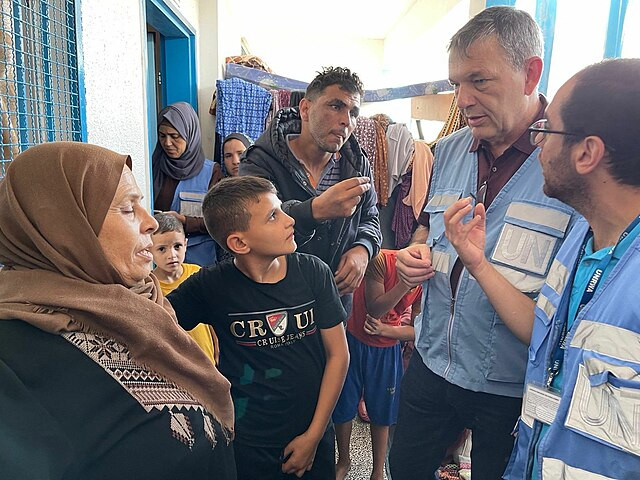Israel has banned the United Nations Relief and Works Agency for Palestine Refugees in the Near East (UNRWA) from operating within its territory. The decision comes after allegations surfaced that several of the agency's employees were involved in the October 7 Hamas attack on southern Israel, which resulted in over 1,200 Israeli deaths. The ban, which was passed by the Israeli Knesset on Monday, could have far-reaching implications for humanitarian efforts in Gaza and the West Bank, where UNRWA has been the primary aid provider for millions of Palestinian refugees.
Israeli Prime Minister Benjamin Netanyahu emphasized that "UNRWA workers involved in terrorist activities against Israel must be held accountable." This move follows a U.N. investigation that revealed nine UNRWA employees had participated in the October attack, prompting their termination from the organization. While UNRWA has publicly denounced their involvement, Israel's decision to bar the agency reflects broader concerns about its ties to Hamas.
UNRWA provides critical services to around 5.9 million Palestinian refugees across Gaza, the West Bank, and neighboring countries. These services include operating schools, hospitals, and social services, as well as distributing humanitarian aid. However, Israel's new legislation would not only prevent UNRWA from functioning within its borders but also disrupt its ability to coordinate with Israeli authorities, including the Israel Defense Forces (IDF), which is crucial for the agency's operations in the conflict zones.
The ban could also force the closure of UNRWA's office in East Jerusalem and deny its workers the necessary visas to continue their work. Amnesty International warned that the move "amounts to the criminalization of humanitarian aid" and could exacerbate the already dire humanitarian crisis in Gaza, where many residents are at risk of famine and disease.
While Israel has long criticized UNRWA for what it sees as an alleged tolerance for Hamas-affiliated personnel, the recent revelations have heightened tensions. Israel's military claimed that two Hamas commanders killed in recent operations had been on UNRWA's payroll, further fueling accusations that the agency had been infiltrated by militants.
In one case, Mohammad Abu Itiwi, a Hamas commander involved in the October attack, was employed by UNRWA until his death in a recent Israeli airstrike on Gaza. Another employee, Fateh Sherif Abu el-Amin, was placed on leave after concerns about his ties to Hamas before being killed in an airstrike in southern Lebanon.
The United Nations has voiced deep concerns about the ramifications of Israel's decision. James Elder, a spokesperson for UNICEF, warned that this could lead to the "collapse of the humanitarian system in Gaza," where many rely on UNRWA for basic necessities. U.N. Secretary-General António Guterres echoed these concerns, stating that UNRWA "is the principal means by which essential assistance is supplied to Palestine refugees in the Occupied Palestinian Territory" and that there is no immediate alternative to the services it provides.
The ban also sparked international alarm, with governments around the world questioning how aid would continue to reach Gaza's population, particularly amid reports that 233 UNRWA staff members have been killed and many of its buildings have been damaged during the ongoing conflict. Currently, only seven of the agency's 27 health centers in Gaza remain operational.
The timing of Israel's move coincides with the ongoing war in Gaza, which began after Hamas's October attack. In retaliation, Israel launched an extensive military campaign, resulting in the deaths of over 42,000 Palestinians and the displacement of millions. Jabalia, Gaza's largest refugee camp, has become a focal point of the conflict, with hundreds killed in recent strikes.
Adding to the complexity is UNRWA's critical role in a large-scale vaccination campaign against polio in Gaza. The agency's 1,000 healthcare workers represent a third of the workforce on the ground, raising concerns about how the vaccination effort will continue without UNRWA's infrastructure.
Established in 1949 to assist Palestinians displaced during Israel's war of independence, UNRWA has been a lifeline for Palestinian refugees across the region. It provides education, healthcare, and emergency relief, and its clinics see around 8.5 million patient visits annually. The ban now threatens to dismantle decades of work and could trigger further unrest in an already volatile region.
The U.S. State Department expressed concern over Israel's decision, with spokesperson Matthew Miller emphasizing that "UNRWA plays a critical, important role in delivering humanitarian assistance to civilians that need it in Gaza." However, with Israel standing firm on its stance, the future of UNRWA's presence in the region remains uncertain.
USA Today and Al Jazeera also contributed to this report.






